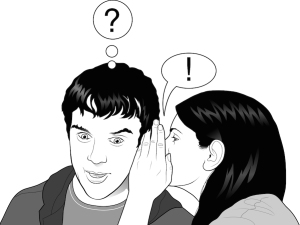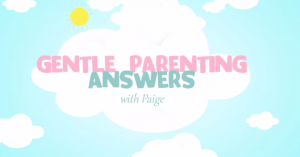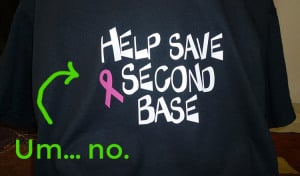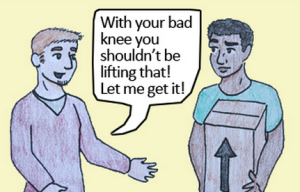So your friend has just come out to you as transgender. This is a huge step.
Chances are, this friend must trust and respect you a great deal. Coming out as trans is, on its most basic level, a sharing of a deep and important truth. They are giving you insight into something very personal. I hope you can feel grateful knowing that someone trusts you in this way.
I won’t presume to know how you feel about this transition, though. Everyone has a different response. We don’t always have the magical, overjoyed, unconditionally loving reaction that we wish we could have.
And that’s okay!
Whether you were happy, or sad, or scared, or all of those things, we all have work to do on being more supportive of one another. It’s not like we emerge from the womb with a complete knowledge of how to care for each other. Compassion takes practice, trans or not.
So kudos to you for seeking out a resource like this one. I’m glad that you want to find ways to be supportive, and that you’re honoring this trust you were given by standing by your friend.
As a transgender person myself, I can tell you that the support I received from my friends meant the world to me. And chances are, it means a lot to your friend, too.
But you might not know where to begin. How can you simultaneously work through your own feelings and be as supportive as possible to your friend in need?
The ball is in your court. And here are six ways you can support them.
1. Find an Appropriate Space to Process Your Thoughts and Feels
Holy guacamole! Transgender?
Maybe it’s been a long time coming, or maybe you’re completely shocked. You might be scared, or uncertain, or downright confused. Whatever you’re feeling, it’s understandable that you have some processing to do.
Because while your friend has had years to come to this realization, you haven’t had much time to figure it all out.
That’s totally okay! Take some time, some space, and unpack those thoughts and feels.
However, the important thing to know is this: It is not your friend’s responsibility to help you sort out your feelings.
That is, while it’s perfectly understandable that you might be struggling with your friend’s transition, it’s not fair to unload that weight onto your friend.
Your friend already has a lot on their plate. A transition is a big step! And chances are, they’ve come out to a lot of people at once. They are likely not in a position to guide each individual person through the complicated feelings that they have about this transition.
Nor should they – during such an emotional time, it could be hurtful (and even traumatic!) to try to ease people into acceptance.
Your friend has asked for your support during a really challenging life event. It’s not an appropriate time to demand that they shoulder your emotional baggage when they are already carrying such an enormous weight!
Instead, seek out a support group, whether it’s online or offline. Look to other friends that you trust to help you process your feelings. Journal about what you might be thinking. Seek a creative or physical outlet that lets you release some of the stress you might be feeling.
This allows you to be in a better place to support your friend and ensures that you won’t be triggering your friend by saying something unintentionally hurtful as you try to process.
2. Do Your Homework
I’m going to sound like a broken record by now, because this is far and away the most frequent advice I give to allies of trans folks.
But it’s true! You gotta do your homework!
The Internet is a magical place, and there’s an enormous wealth of information out there on the transgender community. And if you’re looking to support your friend, it’s a great idea to do a little bit of research.
This takes your friend off the hot seat instead of forcing them to painstakingly educate you (and many others) on every little aspect of their experience.
This article is a great place to start, but there are many other places to go from here! GLAAD has an abundance of friendly resources to get you started on the basics. You can always poke around the transgender tag or non-binary tag here at Everyday Feminism, too.
And depending on how your friend identifies (maybe they’re neutrois, non-binary, or genderqueer!), there are so many fantastic blogs written by trans folks where you can get direct insight into the experience of being trans.
If you’re overwhelmed by the reading, you can always hop over to YouTube and let Ash Hardell (and fantastic special guests!) school you on everything gender, or check out Dr. Doe at Sexplanations as she chats about the social construction of gender in sailor attire (no, seriously, she’s dressed like a sailor).
You’ll have the benefit of deepening your knowledge of gender (how cool!), and your friend will appreciate that you took the time to learn.
3. Respect and Validate Their Identity
The worst thing you can do for your friend is invalidate their identity. When your friend comes out as transgender, it’s not your place to greet them with disbelief, amusement, contradiction, or a refusal to recognize their gender.
Regardless of how you perceived them in the past, it’s your responsibility to believe your friend when they come out – and affirm their sense of self.
For example, when I came out, a number of people told me they were having a difficult time believing me because I had worn dresses in the past and had seemed to enjoy femininity. They suggested that I was confused and should take more time to think about it.
When a trans person comes out to you, it isn’t your place to tell them how they should or shouldn’t identify. No one can know someone’s gender except for the person themselves. If they say they are non-binary, they are. If they say they are a woman, they are. If they say they are a man, guess what? They are.
This probably goes without saying, but support means using the name they have asked to be called, using the pronouns that they have requested, and tuning in when they share their experiences – without judgment, without contradiction, and without accusation.
Remember that appearances can’t tell you what someone’s gender is. Gender is not something you can necessarily see, although we sometimes choose to express our gender in a particular way. Gender is not a haircut, a way of dressing, a set of body parts, or a set of behaviors. Gender is a sense of self, an identity that is only for us to declare.
So please, don’t say things like “But are you really?” or “I don’t believe that” or “Those pronouns are too complicated.”
If you are having a hard time accepting someone as transgender, give yourself the space and time you need to get to a place where you can better support this person before attempting to give support.
4. Don’t Just Talk the Talk
Sometimes being supportive means showing the fuck up.
Being an ally is about more than just vocalizing your support. One really excellent and helpful way to show that you’re standing by your friend is to offer tangible, concrete support to make their transition a little bit easier and make our lives as trans people a little bit safer.
Do they have a doctor’s appointment or a surgery consultation? Offer to drive or hang out in the waiting room. Are they going to court to legally change their name? Bring them flowers and accompany them. Are they shopping for new clothes? Ask to tag along.
If your friend is using a public restroom but they’re afraid for their safety, offer to go with them. If they’re fearful of using public transportation, offer to ride with them or give them a ride. If they need to get home after a fun night out, offer to call them a reputable cab or walk them home. Because while the victims are never at fault, the reality is that transgender people are statistically more likely to be the victims of violence and assault.
And if your friend is experiencing body dysphoria, I’ve written an entire article on steps you can take to support them.
And of course, ask your friend if there’s anything you can do. Your friend may have something in mind that they won’t ask for unless prompted.
We are the experts on our own experience, so it’s best to check in with us before assuming our needs.
5. Be an Ally and Advocate (Without Overstepping)
Support can be personal, of course, and standing by your friend through their transition is a valuable and wonderful thing.
But in today’s world, being transgender is sadly not just a personal struggle. Often times, it’s political. There are difficult battles each and every day being fought over our right to exist, our right to be recognized, and our right to be safe.
Being a supportive friend can also mean being an ally – because creating change is one of the best ways to make your friend’s transition safer, easier, and more empowering.
“Whoa,” you might say. “That sounds serious. But where do I even start?”
Well, here’s a list of 52 things you can do for transgender equality. Yes, 52; so don’t tell me there’s nothing to be done! You can do one thing per week for a year, damn it.
Ultimately it means making sure you are politically engaged and aware when there are issues at stake for the trans community (hint: this means always).
It can be as simple as voting “yes” on local ordinances that will support the trans community or calling someone in when they say something problematic about trans people.
It can mean being involved at your local LGBTQIA+ center and canvassing for a trans cause or donating to a fantastic trans organization.
But it also means stepping out of the spotlight and allowing trans people to lead and tell their own stories.
You should amplify the voices of trans people – sharing their work, inviting them to conferences and universities, getting them involved wherever possible – rather than speaking over them.
There’s always more work to be done. And if you’re looking to support your friend who is trans, it’s time to make this world a better place for all trans people.
6. Learn to Take Criticism and Know How to Apologize
Even if you follow every bit of advice in this article, you will still make mistakes. And I want to remind you that making mistakes is okay, as long as you’re willing to receive criticism and apologize sincerely.
Remember that regardless of your intention, your impact is still important. You may not have meant to spill coffee on my shirt, but I imagine that if you did, you would still apologize and you would still try to help me clean things up. Because, you know, I’m assuming you’re a nice person.
You may mix up your friend’s pronouns by accident. You may say something insensitive, only to realize this later on. Even I, as a trans person, make mistakes with other trans people from time to time. We’re all learning. Every single one of us!
Just recently, a thoughtful friend and fellow Everyday Feminism writer, Adrian, explained to me that a word I was using was actually extremely harmful to trans women. Instead of getting all prickly and defensive about it, I had to remind myself that this was a great opportunity to do some growing and avoid hurting others in the future.
Even I make mistakes! What’s most important is to learn from those mistakes.
So how do you apologize?
When you misgender someone, it’s best to offer a quick apology, a correction, and let the conversation move forward. Nothing is more awkward than a person spending five minutes apologizing for misgendering you and completely redirecting the conversation. I shouldn’t feel like I have to console or comfort you after you’ve made a mistake, right?
When there’s a bigger hiccup – maybe you’ve said something offensive without realizing it – it’s good to know how to give a sincere apology. There’s an amazing video that breaks this down that is basically required viewing for anyone who aspires to be a decent human.
As the brilliant Franchesca Ramsey says in her video, “A real genuine apology is made up of two parts: the first part is you take responsibility for what you’ve done, and then the second part is you make a commitment to change the behavior.”
If you’ve said something that is hurtful to your friend, an apology can be the difference between a rift in your relationship and an opportunity for growth. Never underestimate the power of a sincere apology.
***
When a friend comes out to me, I feel honored. You know why? They’ve chosen to include me on a really special and important journey. They’ve shared this truth with the hope that I will unconditionally support them for who they are.
When they choose to include me, it’s my chance to prove that I am worthy of that trust.
If you’ve made it this far into the article, I’d venture to say that your friend was right to trust you. Because regardless of how you feel about their transition, you are still invested in supporting them and doing the right thing.
For that reason, you have my utmost respect and gratitude.
When I first came out, I was worried that I would have to go it alone. I was afraid that I would be carrying this huge weight all by myself, and I wasn’t sure if I could do it. But I was lucky enough to have people in my life who stepped in, and they helped me to move forward when I was convinced I couldn’t.
And why did they step in? Because in life, when a friend needs you, you step up. That’s what friends are there for, through thick and thin.
I hope that this article gives you some insight on how to walk the walk now.
I wish you and your friend all the best as you move forward. Together.
[do_widget id=’text-101′]
Sam Dylan Finch a Contributing Writer for Everyday Feminism. He is queer writer, activist, and educator based in the San Francisco Bay Area. In addition to his work at Everyday Feminism, he is also the founder of Let’s Queer Things Up!, his hella queer and very awesome blog. You can learn more about him here and read his articles here. Follow him on Twitter @samdylanfinch.
Search our 3000+ articles!
Read our articles about:
Our online racial justice training
Used by hundreds of universities, non-profits, and businesses.
Click to learn more





















